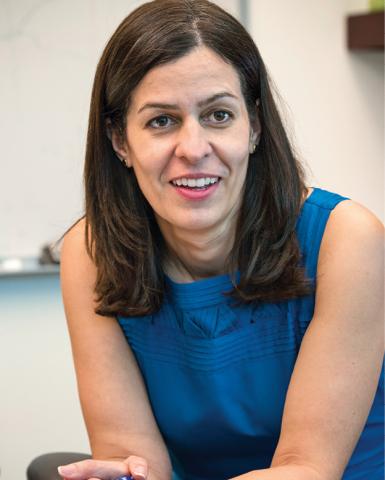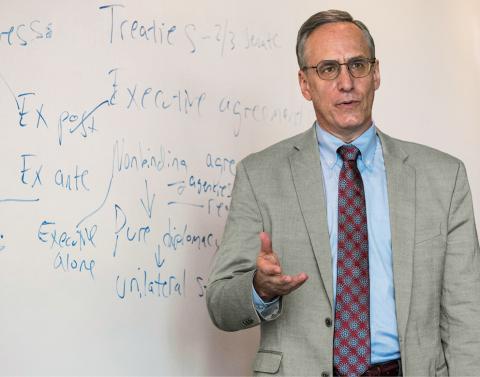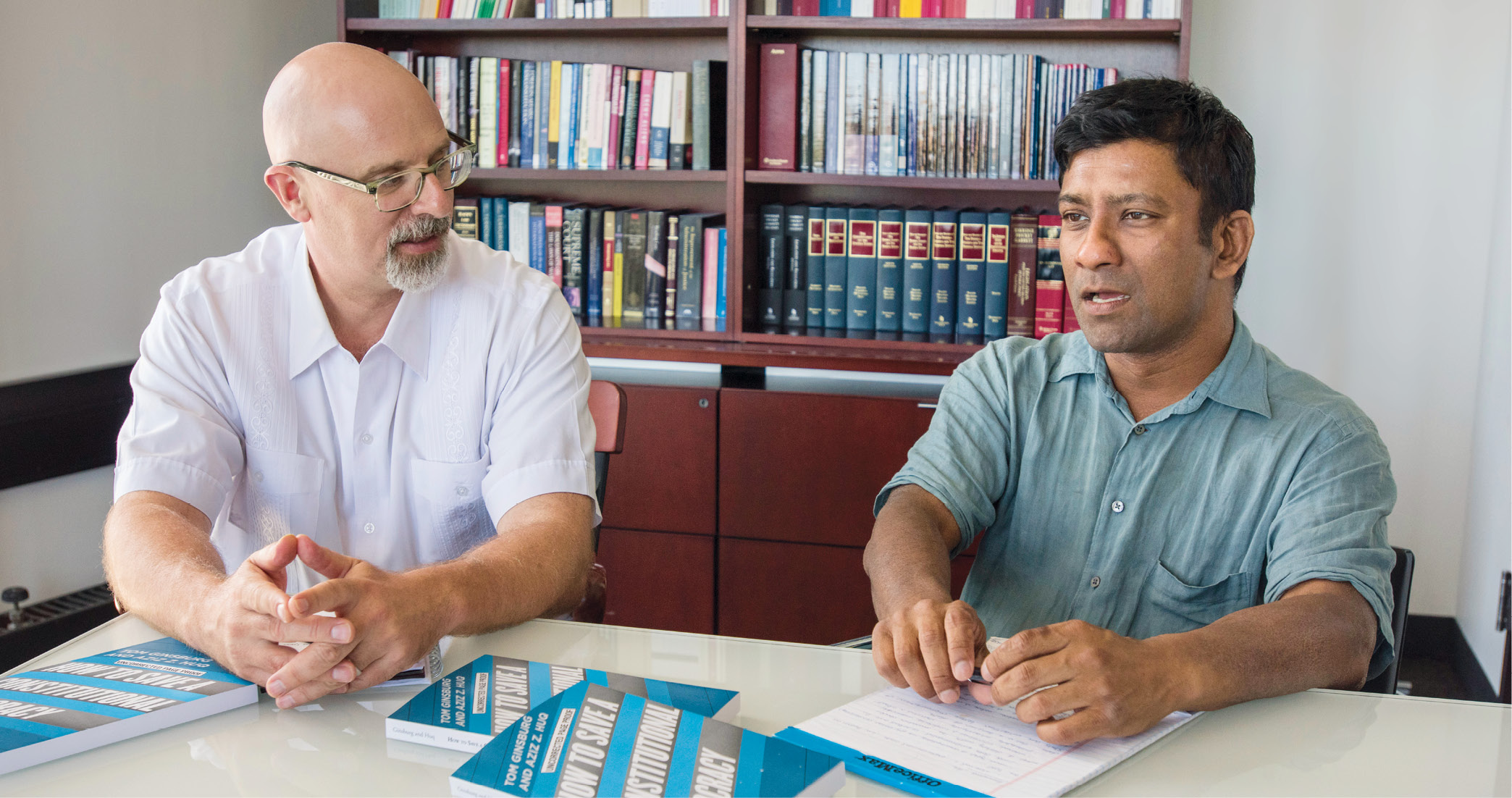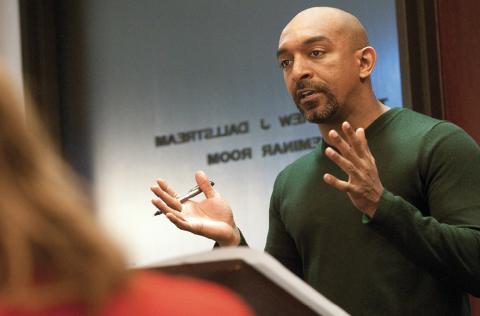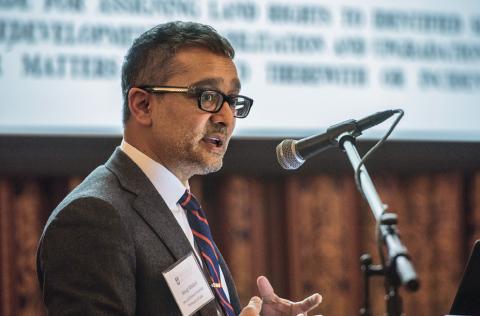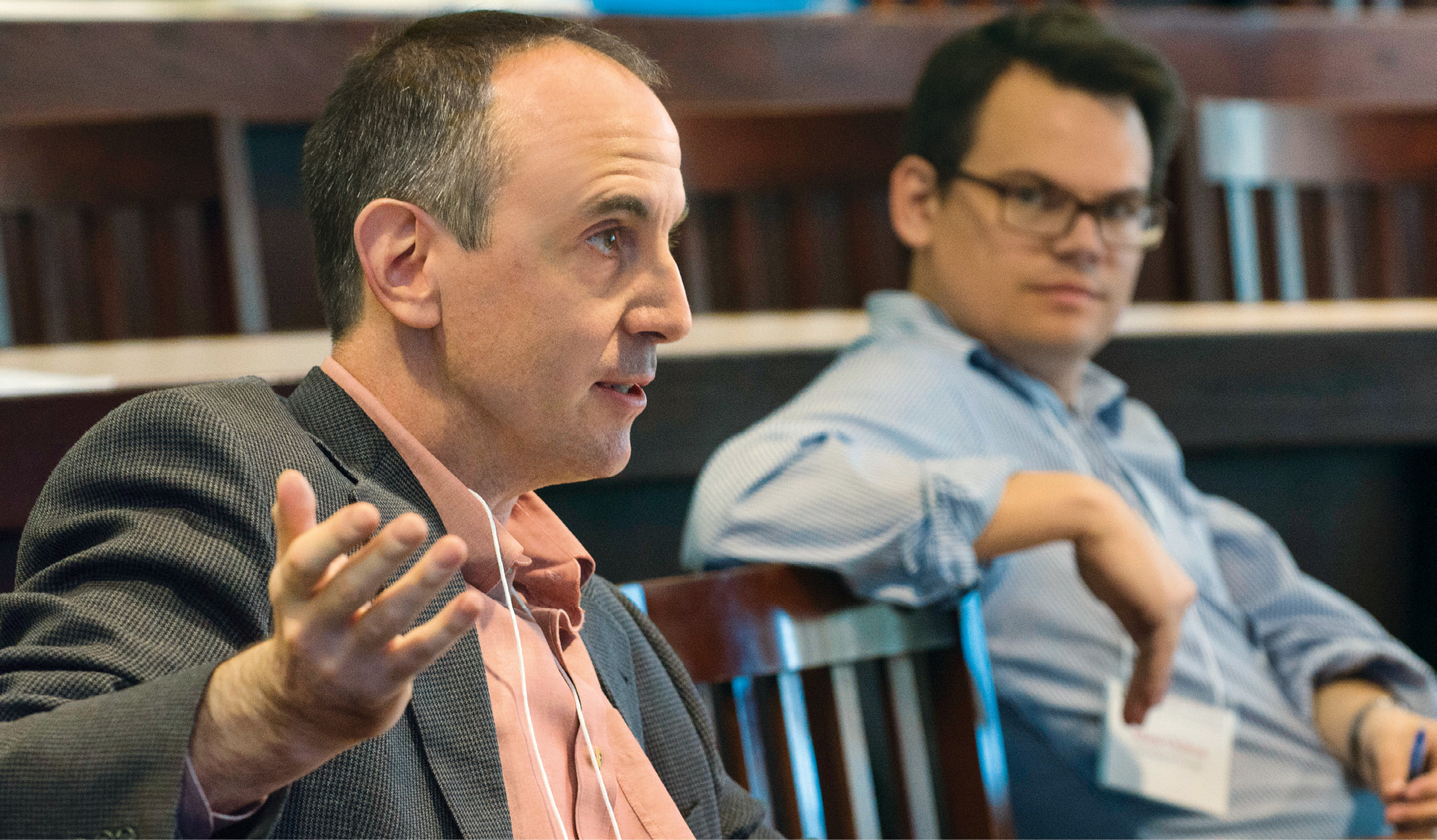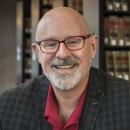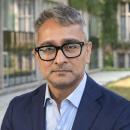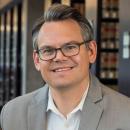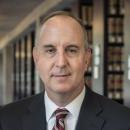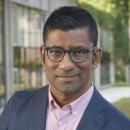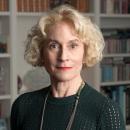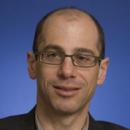Global Impact
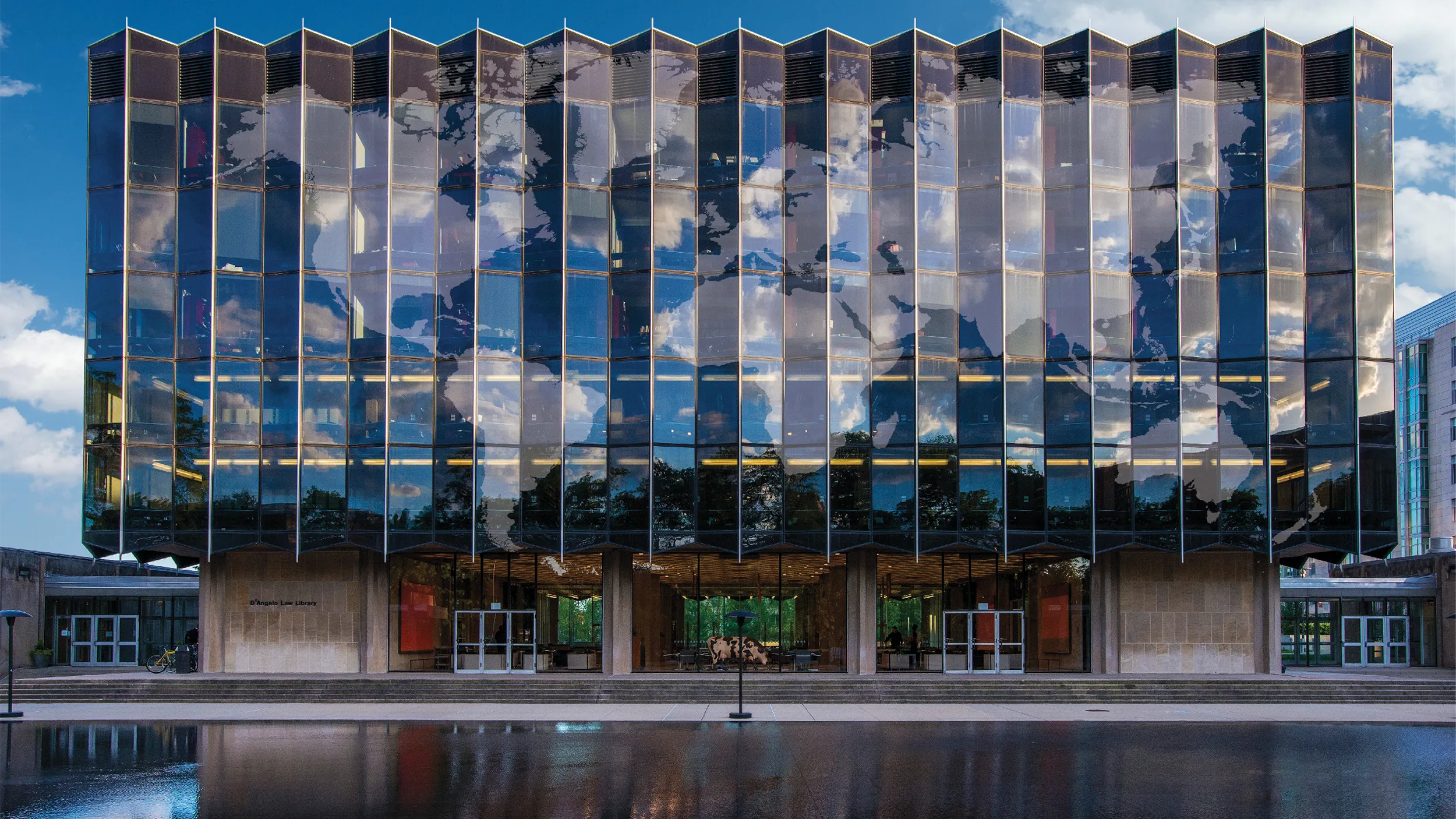
Professor Tom Ginsburg counsels foreign governments and international organizations on constitutional design, is a leading expert on democracy around the world, and cofounded an acclaimed project that produces the most comprehensive data on the world’s constitutions, providing critical information for scholars and constitutional drafters.
Professor Anup Malani, a health and development economist, advised governments in India and Indonesia on COVID policy during the pandemic and conducted influential research on the prevalence of COVID antibodies, vaccine distribution policies, and the economic impact of the pandemic—work that contributed valuable knowledge to the global fight against COVID-19.
And Professor Adam Chilton helped create the world’s most comprehensive collection of competition laws and enforcement practices and co-led a groundbreaking project that used survey experiments, statistical analyses, and case studies from around the world to study whether including rights in constitutions improves protection of human rights.
Law School scholars are bringing their signature blend of boundary-pushing intellect to bear on some of the world’s most challenging international issues and redefining how scholars in these fields approach tough questions with real-world effects. They have used empirical work in important new ways, pushed back against commonly held beliefs, and are at the forefront of conversations about how data can be used to test theories and directly address global concerns. These and many other contributions reflect a long tradition of pioneering work that has fostered important debate in the area. In 2005, Professor Eric Posner coauthored an influential (and, at the time, controversial) book arguing that international law is less powerful than many believe—a contribution that set the stage for contemporary discussions about the role of social science in international law scholarship.
“Our scholars’ work is having a tremendous and important impact on our world, from Professor Anup Malani’s innovative work in India before and during the pandemic, to Professor Tom Ginsburg’s contributions to constitutional reform around the world, to the many examples of pathbreaking empirical scholarship that are pushing the field of international law in new directions,” said Dean Thomas J. Miles, the Clifton R. Musser Professor of Law and Economics. “Our eminence on the world stage, and within the fields of international and foreign relations law, reflects our commitment to rigorous inquiry and interdisciplinary collaboration as well as our willingness to critically examine and develop new ideas.”
The Law School’s global contributions are accompanied by expanded international law programming for students, an engaged international alumni base that includes 1,442 JD, LLM, and JSD alumni living abroad in 76 different countries, and a wide variety of opportunities for international scholars to visit the Law School. For instance, the Law School has for 10 years hosted Israeli scholars through the Greenbaum Visiting Professorship, including Ariel Porat, now the president of Tel Aviv University. For many years, the Coase-Sandor Institute for Law and Economics hosted international scholars for its annual Summer Institute in Law and Economics, drawing from more than two dozen different countries. And the Law School’s LLM and JSD programs attract students from around the world, incorporating the valuable perspectives of those who have lived and worked in different legal systems.
The rising global impact comes at a pivotal time. The increasingly complex field of international law is grappling with urgent questions related to globalism, rising nationalism, and the need for international cooperation on a host of looming worldwide challenges—public health, human rights, climate change, migration, trade, and more. And the critical mass of Law School scholars, who bring a range of disciplinary expertise, experiences, and perspectives, has created a powerful momentum fueled by a variety of professors in addition to Ginsburg, Malani, and Chilton.
In the past several years, the Law School’s Global Human Rights Clinic, led by Clinical Professor Claudia Flores, produced influential reports on global police lethal-use-of-force policies that were cited, among other places, in a report by the UN Office of the High Commissioner for Human Rights. Flores, a human rights lawyer whose work has spanned the globe, has led students in submitting a report to the UN Human Rights Council documenting Vietnam’s violation of its citizens’ right to freedom of expression, researching gestational surrogacy practices in Cambodia, and designing and delivering multiple trainings on strategic litigation and comparative foreign law to lawyers in Tanzania who were challenging inhumane prison conditions. Flores advises governments on state obligations under the Convention on All Forms of Discrimination Against Women (CEDAW) in constitutional and legislative drafting processes, and before joining the Law School, fought for women’s equality in East Timor, helped incorporate human rights principles into the national constitution in Zimbabwe, and advocated for victims of human trafficking in Indonesia.
In 2021, Professor Curt Bradley, the Allen M. Singer Professor of Law and a pioneer in the field of foreign relations law, joined the Law School, bringing with him a reputation for interdisciplinary collaboration, an important annual conference of leading foreign relations law scholars, and innovative scholarship. Among other research, he coauthored an unprecedented empirical study of binding international agreements made by US presidents—a project that offered rare insight into executive-branch systems that are now the subject of a Congressional proposal to improve transparency.
In addition, Daniel Abebe, a University of Chicago vice provost and the Harold J. and Marion F. Green Professor of Law, often focuses on the relationship between the constitutional law of US foreign affairs and public international law. In 2019, he and Ginsburg coauthored “The Dejudicialization of International Politics?,” a paper that pushed back on the idea that courts are playing more of a role in international law and instead examined the conditions under which courts lose their power to adjudicate international law disputes.
Aziz Huq, the Frank and Bernice J. Greenberg Professor of Law, has written extensively on comparative constitutional law and in 2018 coauthored a well-reviewed book with Ginsburg, How to Save a Constitutional Democracy, that explored the structure, decline, and preservation of democracy throughout the world. It won the International Society of Public Law’s 2019 book prize.
Both Posner, the Kirkland & Ellis Distinguished Service Professor of Law, and Martha C. Nussbaum, the Ernst Freund Distinguished Service Professor of Law and Ethics, have examined international human rights in different ways. Among other contributions, Nussbaum’s Capabilities Approach shaped the global conversation about human rights and development and has been honored with numerous awards. Posner has examined the effectiveness of human rights laws, arguing that although countries publicly pledge their commitment to human rights, laws are often vague and purposely unenforceable and compliance metrics are easily manipulated. This was a claim he explored in his 2014 book, The Twilight of Human Rights Law.
Ten years earlier, he and Jack Goldsmith of Harvard Law wrote The Limits of International Law, a contribution that Ginsburg called a “defining moment” for the field, though, at the time, it ruffled feathers. Although it wasn’t intended to be wholly skeptical of international law—or to say that international law wasn’t law, as some critics suggested—the book did question claims about the success of international law, including the overall capacity of international law to address major problems like climate change or global financial crises and the willingness of states to bind themselves to international law.
Now, more than a decade and a half later, Posner said he remains skeptical of normative claims about the power and effectiveness of international law.
“Those are empirical questions,” Posner said at a 2021 conference that included a panel reflecting on the book and its reception. “Theory can help you organize your thoughts about those questions and come up with hypotheses that can be tested.”
He said he sees the turn toward empirical work as a positive development. Posner does not credit the shift to The Limits of International Law—especially given the trend toward empirical work across legal scholarship. But Ginsburg said the discussion that arose after its release did mark a turning point.
“At the time, traditional international legal scholarship was very doctrinal,” said Ginsburg, who in 2012 documented the shift with his coauthored paper, “The Empirical Turn in International Law Scholarship.” “It assumed that norms were going to be efficacious. It hoped, optimistically, that international law would [work], that we’d have world peace and justice, if states just followed it. And I think a lot of us at Chicago specifically have been skeptical of that.”
Empirical Contributions to International Law
That skepticism has run like a thread through much of the work embraced by Law School scholars who advocate the use of experiments, surveys, and data analysis to test theories about what does, and does not, work within international law—an approach aimed at creating research that can help address major world challenges.
“This is the single biggest concentration of people doing work using the social science approach to international law in the United States,” said Ginsburg, the Leo Spitz Professor of International Law.
“Rather than making normative arguments trying to advance a specific claim, we’re asking the big questions about what [international law] is and when it works … and we’re using rigorous methods to answer them,” he said. “It is our belief that doctrinal work has to take into account empirical possibilities if you want to advance justice in the world.”
Ginsburg, Chilton, and Abebe—who each have a PhD in political science in addition to a JD—coauthored a 2021 essay, “The Social Science Approach to International Law,” that explored the two-decade move toward empirical work, exploring its history, applications, and limitations. They don’t advocate abandoning other approaches, but rather continuing to incorporate a wide variety of social scientific tools to test the theories that are being explored.
The limitations, Abebe said, include poor quality data and the impact of researcher decisions on empirical findings, including how to collect, clean, and organize the data; which research questions to ask; how to measure the data; and what conclusions to draw.
“But overall, the trajectory is very, very positive,” he said at a 2021 virtual conference hosted by the Law School’s student-led Chicago Journal of International Law. “The quality of the data is much better, the amount of the data is much better, the collection and maintenance of data is of higher quality, [access is greater and faster] … and we’ve developed better and more sophisticated methods to understand the data.”
Some of that is due to the work of Law School scholars, who are collecting and analyzing data that can help answer important questions about human rights, competition, labor agreements, and much more.
For instance, in 2005, Ginsburg and two collaborators launched the Comparative Constitutions Project to provide comprehensive data on the world’s constitutions—information that could help researchers study the origins and consequences of constitutional choices and provide crucial insight to those working to revise constitutions. Through the project, initially funded by the National Science Foundation, researchers have collected and analyzed thousands of constitutional texts and made the data publicly available. Nearly a decade ago, they partnered with Google to launch Constitute, an award-winning website that contains an indexed set of texts for every national constitution in the world.
Ginsburg has drawn on these data in some of his own work, including the 2009 book The Endurance of National Constitutions (coauthored with his CCP codirectors Zachary Elkins and James Melton), which was the first comprehensive study of why some constitutions endure and others do not. The volume won a best book award from the American Political Science Association in 2010. He’s written dozens of articles using the data, and it also informed his 2018 book with Huq.
His work has had a global impact in other ways, too: his expertise has made him a valuable resource to numerous international development agencies and foreign governments engaging in legal and constitutional reform. Ginsburg has engaged in projects around the world, including in Afghanistan, Cambodia, Chile, Fiji, Sudan, Tajikistan, Thailand, Tunisia, and Tuvalu, among others.
Chilton, too, has used empirical analysis in a number of international law projects that address important global questions. Among them: a project that uses a variety of research methods—including survey experiments, statistical analyses, and case studies from around the world—to study whether including rights in constitutions improves protection of human rights. That project included a book coauthored with the University of Virginia School of Law’s Mila Versteeg, How Constitutional Rights Matter, that won the International Society of Public Law’s 2021 book prize.
In late 2019, Chilton and Columbia Law’s Anu Bradford released the world’s most comprehensive collection of competition laws and enforcement practices, providing researchers, lawyers, journalists, and policymakers with new tools to assess the economic impact of these laws across borders. The ambitious, five-year project drew on new data on the evolution of competition laws and offered several publicly accessible sets of data.
Chilton also has used empirical analysis to study how bilateral labor agreements can be used to promote international labor migration.
Approaching these questions with empiricism, skepticism, and normative restraint is critical to having an impact in the real world, Ginsburg said.
“You have to actually look at what’s happening in the world and not be too ideological about it—and that approach is something that I associate with the University of Chicago,” Ginsburg said.
“I think we have followed the Chicago tradition in going our own way,” he added, “and in ways that, hopefully, will change the entire field.”
Innovation and Collaboration
The Law School’s culture—particularly core values of interdisciplinary inquiry, critical thinking, and collaboration—is a driving force behind its approach to global challenges.
Malani, the Lee and Brena Freeman Professor of Law, has long engaged in innovative, interdisciplinary work abroad, drawing on his deep expertise in law and economics, health economics, and development economics. He has extensively researched India’s slums, economics, and healthcare system, including leading an evaluation of India’s first national health insurance program. He also cofounded the International Innovation Corps, which sends graduates from the University of Chicago and foreign universities to developing countries like India to work on health, energy, technology, and education projects.
When the pandemic hit, he drew upon the research, resources, and network he had spent years developing and helped launch several major projects. He first helped organize a coalition of private companies in India to support the government’s pandemic response. That coalition was critical in ensuring the foreign procurement of COVID tests early in the pandemic and helping keep supply chains functioning during India’s sharp lockdown. Malani also organized and led a team that developed statistical modeling strategies that were used to chart COVID’s spread and the impact of different containment measures, ultimately helping guide COVID policy in multiple states across India.
He helped develop vaccine distribution strategies in India and Indonesia. He led antibody surveys to determine how widespread infections were and studied the financial impact of the pandemic on households in India, as well as on income inequality. With support from the Asian Development Bank, Malani also advised the Indonesian government on how to model COVID and how to prioritize the distribution of vaccines. Likewise, he worked with World Bank on COVID strategy in South Asia more broadly.
Malani’s work on COVID has won two Emergent Ventures prizes from the Mercatus Center at George Mason University, as well as several grants. His work also led Apolitical to designate him as one of the 100 academics that are most influential in government.
“There are three ideas that have guided my work in India and elsewhere,” Malani said. “First, while US law schools focus largely on US problems, they have skill sets that would be very helpful if applied to policy problems in lower- and middle-income countries. Our North Star should be big, tractable problems, not just publishable papers. Second, research alone does not generate policy change. You have to go out and try to lobby for and implement your ideas. Third, governments will work with you when they trust you. That trust is built up over years of persistent engagement. None of what we did in India during COVID would have been possible if IIC had not been working across India the previous seven years.”
Malani has long made a practice of seeking out the data necessary to shed light on seemingly unsolvable problems. While researching India’s slums—about which there was very little economic data—Malani worked with a team to collect the information themselves, a process that required hundreds of interviews.
“If I wanted to learn about slums [I knew that] I would have to talk to slum dwellers myself,” Malani told Law School students during his Midway Dinner address in February 2020.
“I met with folks in Anthropology and learned how to do ethnographic work—how to conduct guided interviews that covered the topics that interest me, but allowed slum dwellers to tell me about things I didn’t even know to ask about. Then I spent three years visiting and interviewing people in slums,” he said. “I worked with my colleague Adam Chilton and a team of research assistants who could speak local languages we did not know. In the end we interviewed over 600 people across 24 slums and 11 cities in India. We even visited slums in Nairobi and Brazil to see if the slums in those countries had the same problems.”
The research led to valuable information, including offering insight on why one of the most common policy responses, making low-income housing outside the slums available, was only partly successful. (The answer was complex, but it came down to economics: most slum dwellers had needs that they valued more than formal housing, and as a result, they were more likely to sell the housing and return to the slums.)
In his Midway Dinner talk, Malani told students that the University of Chicago’s culture helped make work like this possible.“It is the one school that places no bounds on your curiosity,” he said. “Our seriousness is … why people seek our advice so often. It is what makes us indispensable.”
Collaboration also has been at the heart of many of Chicago’s global contributions. At the Law School, scholars with different areas of expertise, and different viewpoints, routinely come together—allowing everyone to dig more deeply and to develop new ideas.
“We are a close community by nature, and I think that really fuels collaboration,” said Flores, who regularly collaborates with both clinical and academic faculty and cohosts a podcast with Ginsburg. In addition to leading the clinic, Flores regularly writes and lectures on constitution-making and reform, the rights of women and migrants, and human rights and policing.
“I’ll be thinking about certain things in the clinical or practice context, and then I’ll talk to colleagues who are thinking about those things in a different way and in a different context,” Flores said. “For instance, I can’t tell you the number of times that Adam Chilton and I have been having a casual conversation and realize we’re working on all of these overlapping issues. And Tom Ginsburg and I work on many of the same issues. We have different perspectives on them, but that’s what makes the conversation really exciting. I think in the end we all inform each other.”
Bradley, who is known for pushing back against conventional wisdom, has been a particularly good fit, Ginsburg said.
“Curt is supercharging us because he’s a very collaborative person,” Ginsburg said. “He’s always putting on conferences and workshops. He brings people together in interesting ways. He writes with other people. And so I think adding him to an already collaborative environment is going to mean that we’re going to have a lot more work coming out of Chicago.”
Bradley is known for bringing top minds together to carve out new paths of inquiry. A global conference series he hosted several years ago resulted in a 900-page volume that laid the framework for the emerging field of comparative foreign relations law. That book, The Oxford Handbook of Comparative Foreign Relations Law, which Bradley edited, earned him the American Society of International Law’s inaugural Robert E. Dalton Award for Outstanding Contribution in the Field of Foreign Relations Law in 2021.
His 2020 paper, “The Failed Transparency Regime for Executive Agreements: An Empirical and Normative Analysis”—coauthored with Harvard Law’s Goldsmith (who coauthored The Limits of International Law with Posner in 2005) and Oona Hathaway of Yale Law—was a similarly big undertaking. The scholars wished to explore the system surrounding the hundreds of binding international agreements that US presidents make each year—a system about which little information was publicly available. Bradley, Goldsmith, and Hathaway spent three years interviewing government lawyers and obtained about 5,600 documents from the US Department of State through a Freedom of Information Act (FOIA) lawsuit.
Student researchers coded the materials, which covered about three decades of information, and then the scholars analyzed the information.
“We looked at whether [the executive branch] was reporting these agreements to Congress and whether it was making the public aware of them,” Bradley said. They concluded that the executive branch’s reporting to Congress has been incomplete, that the process is opaque, and that Congress is “failing in its oversight role.”
The project caught the attention of legislators.
“Congress is now considering legislation that could implement [some of the recommendations] we argued for in that article two years ago—some senators became interested once they saw the data we were able to gather,” Bradley said. “Nobody had done this before—in foreign relations law, there hadn’t been a lot of empirical work. But [gathering the data] allowed us to see things we would not have been able to see if we had tried to study the agreement-making practices of government [without it].”
Bradley, Goldsmith, and Hathaway are now studying the executive branch’s growing practice of entering into nonbinding international agreements, which often fall outside of the reporting and publication requirements that Congress has imposed for binding agreements. Last fall, in his first Law School conference, Bradley gathered about two dozen leading scholars and government officials to examine the issue.
Conferences, collaborations, and faculty workshops have always been central to Bradley’s work, and the Law School’s workshop culture and the focus on interdisciplinary collaboration is part of what drew him here.
“The way to have more creativity is to step outside of what you’re doing and to see it from a different perspective—and a nice way to do that is by regularly engaging and connecting with people who do different kinds of work,” he said. “Chicago’s just fantastic at that.”
Preparing the Next Generation to Confront Global Challenges
In addition to making an impact today, faculty are helping create the next generation of leaders; their eminence is a draw for top students interested in pursuing international law. The wide range of expertise, the interdisciplinary approach, and professors’ willingness to debate and disagree on ideas allow students to build a nuanced understanding of the field, several said.
In recent years, students have chosen from a long list of courses related to comparative and international law, from Global Inequality, taught by Nussbaum and Professor David Weisbach; to Corporate Governance in Emerging Markets, taught by Professor Dhammika Dharmapala; to Equality as a Human Right, taught by Flores; to Comparative Legal Institutions, taught by Ginsburg.
Christy Crouse, ’21, a human rights fellow at a Colombia-based NGO, sought out leading scholars of international law as a student, enrolling in the Global Human Rights Clinic, working as a research assistant for Chilton, and registering for courses with Ginsburg, Chilton, Posner, Huq, and “basically every class offered by Claudia Flores.” She knew she wanted a variety of viewpoints, and she found that.
“I took Public International Law with Professor Posner, which I was excited to do because I knew we had very different—as in opposite—perspectives on international human rights,” said Crouse. “He was one of my favorite professors—he was great at laying out what international law is and putting it very clearly. It was an excellent class.”
Chilton, she said, was one the first professors she got to know at the Law School. She had him for Torts and, later, for The Effectiveness of International Law. As his research assistant, she worked on a variety of projects related to comparative and international law.
“I just love the way he thinks—he’s one of the most organized thinkers I think I’ve ever met in my life,” Crouse said. “He was great at integrating people into even one-off projects—I think one of my first projects was researching a question about information law in Turkey. Later in Law School, I ended up doing more with Professors Ginsburg and Flores, but Professor Chilton was really the one who got me started on research related to international law issues.”
In the Global Human Rights Clinic, Crouse worked on projects with clients from around the world, including UN Women, the International Labour Organization, and activists in Myanmar. Crouse has seen the impact of her Law School preparation in her position at Dejusticia, the NGO in Bogotá. There, she has worked on litigation and advocacy and even written academic articles on human rights issues.
Many students seek out opportunities to work outside class with leading scholars, serving as research assistants, taking advantage of opportunities to hear them speak, or interacting with them through journals work.
Student enthusiasm was immediately apparent to Bradley when he arrived at the Law School.
“One of the first things that happened to me was the International Law Society asked me to give a talk, and it was a packed room,” said Bradley, adding that several of the students followed up to talk more with him after the event. “With the strong student interest in international and foreign relations law, and with the journal, and with all of these scholarly events, speakers, and conferences, Chicago is and will be a major center of activity for the field going forward.”
The powerful relationship between scholars and students was part of a recent decision by the student-led Chicago Journal of International Law (CJIL) to reposition itself as the leading interdisciplinary forum on the study of international law. During the 2020–2021 academic year, the journal redesigned its annual symposium to feature scholars debating cutting-edge issues. At the center of the 2021 discussion was the Ginsburg, Chilton, and Abebe essay that discussed the importance of empirical research.
The move reflected not only this shift within the field and the rising stakes underscored by the pandemic and other challenges, but students’ desire to marshal the expertise and resources available at the Law School.
“What differentiates our faculty is their commitment to values that are often overlooked, but sorely needed, in international law scholarship,” Neema Hakim, ’21, CJIL’s 2020–2021 editor in chief, said at the time. “As their students, CJIL members are well positioned to highlight their common approach and to invite conversation, and dissent, around its merits.”
The 2022 symposium took on a similarly robust topic inspired by faculty scholarship. In March, they convened leading scholars to examine the ways in which legal tools are used to entrench autocracies. The event, which included discussions about the role of international institutions and multinational corporations in combating antidemocratic legal engineering, used Ginsburg’s latest book, Democracies and International Law, as a starting point.
The momentum around international law has been invigorating, students and recent alumni said—and many were eager to have a role in it.
“With the rising importance of international actors, we [as a university and as a law school] are where we want to be—at the vanguard,” said Amber Stewart, ’22, CJIL’s 2021–2022 editor in chief. “We led the way with law and economics, and we can lead the way with international law.”
The Global Human Rights Clinic is another major draw for students interested in the field, in part because of Flores’s impact over the course of her career and in part because of the opportunities offered by the clinic.
“The clinic was absolutely one of the most formative experiences of law school,” said Ana Luquerna, ’21, who came to the Law School because she wanted to focus on international law. “In addition to interesting projects, it also introduced me to a very, very special community [that included] not only a mentor, Claudia Flores, but also peers who have very similar backgrounds, interests, and passions, and who have truly become lifelong friends.”
Luquerna spent two years in the Global Human Rights Clinic, digging into issues like migrant wage gaps and domestic worker abuse. She also served as articles editor on CJIL; worked as a research assistant for Ginsburg; spent a year in the Immigrants’ Rights Clinic; and attended lectures by high-profile government officials, lawyers, and other experts who visited the Law School.
When she graduated, Luquerna secured one of the world’s most prestigious entry points into the field: a judicial fellowship on the International Court of Justice in the Hague, Netherlands. She was the second Law School graduate to do so in five years, following Marcos Garcia Dominguez, LLM ’13, JSD ’19, who served in 2017–2018.
“Chicago is known as a place of rigor, and it’s known for equipping its students to be amazing lawyers. But in addition to providing the legal tools, critical reasoning skills, and the knowledge that I would need to become an international lawyer, the Law School also allowed me to see that my dream of becoming an international lawyer could be a reality,” Luquerna said. “I learned from the amazing international law scholars we have at Chicago, and I graduated with an invaluable network of people who truly cared about my future and were willing to be lifelong mentors.”
For scholars engaged in global work, the interest from students and the critical mass of colleagues whose work has touched international or comparative law—or who are making direct contributions in other countries—is energizing and informative, several said.
The Law School, Ginsburg said, is a place where disciplinary boundaries don’t matter. People with different areas of expertise and opposing perspectives push each other, often opening up new ways of viewing an issue.
“We’re not very concerned with labels, and we’re not very concerned with trying to fit into general trends,” he said. “We’re concerned with asking hard questions and trying to answer them—wherever that takes us.”
